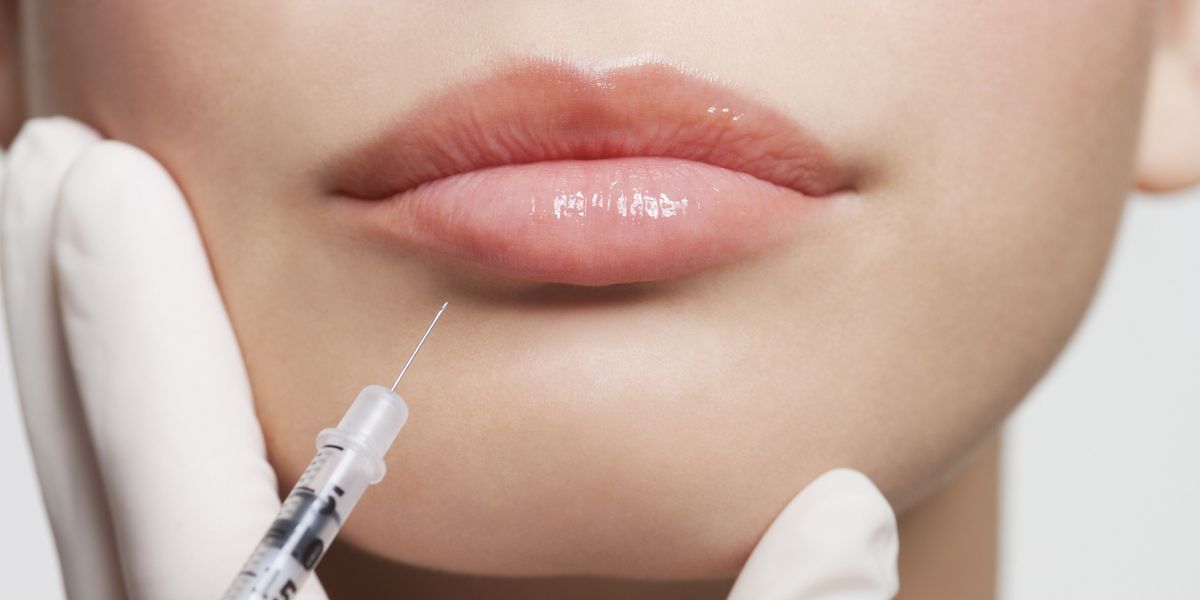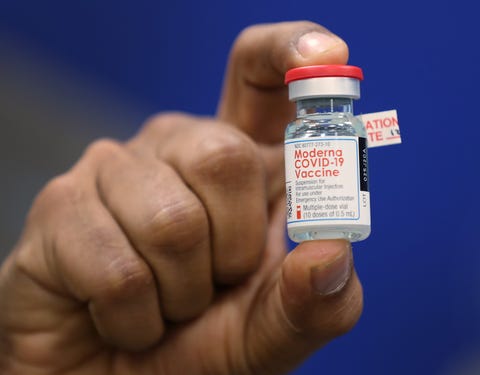As people across the country receive the life-saving COVID-19 vaccine, some have reported adverse reactions to the injection. The vaccine, which was authorized for emergency use in the United States last month, may have side effects for people with cosmetic facial fillers, according to the Food and Drug Administration (FDA). During a meeting of the Vaccines and Related Biological Products Advisory Committee (VRBPAC) in December, the FDA reported that two people with dermal fillers experienced facial swelling after receiving Moderna’s COVID-19 vaccine.
In both cases, cosmetic fillers were injected before vaccination. According to Stat‘s live-blog of the VRBPAC meeting, one woman got fillers six months before receiving the Moderna vaccine, while another got fillers two weeks before. Dr. Samuel Lin, a board-certified plastic surgeon and associate professor of surgery at Harvard Medical School, tells ELLE.com both women were treated and have since recovered. “They didn’t require hospitalization. [The side effects] weren’t life-threatening, certainly, and all these cases were resolved fully with steroid medication and antihistamines,” Lin explains. Despite these possible side effects, Lin urges anyone eligible to receive the vaccine. “At the end of the day, it’s more important to get the vaccination than looking good with your facial fillers.”
Ahead, Dr. Lin answers all your questions about the COVID-19 vaccine and facial fillers.
How does the Moderna COVID-19 vaccine cause side effects for people with fillers?
The vaccine is different because of the mRNA technology versus more traditional vaccines that don’t use such practices. But regardless, all vaccines are prone to causing an immune reaction of some sort for the body to develop the antibodies. So with any response, there can be swelling, there could be lymph nodes enlargement. It can also happen with the flu vaccine—it’s not just limited to the COVID-19 vaccines. However, the three cases of patients reporting facial swelling who have a history of cosmetic fillers has garnered far more attention.
Is it safe for people with fillers to receive the Pfizer COVID-19 vaccine?
They’re very similar, but for one reason or another, the Moderna vaccine seems to have had this reaction with the fillers specifically. It’s also notable that the Pfizer vaccine had—independent of fillers—in the trial period, about six or seven patients who had an anaphylactic reaction. That is a life-threatening trigger to the administration of the vaccine. I think it’s possible [for people to react to Pfizer], but we just haven’t seen that yet at this point.
I have fillers and want to get the COVID-19 vaccine. What should I do?
I would check with your doctor. If someone has a history of lots of allergies or reactions to different things in general, it would be a good idea to talk space with your physician to see if it’s required to have an EpiPen around just in case of a severe reaction. Sometimes you’re not sure who’s going to react or not react.
When can I get the vaccine after getting fillers?
It depends on the individual and the type of filler. But I would say many fillers go mostly away or resolve the residual amounts by about six months or so, just on average. Of course, some sooner, some later. I would check with your dermatologist or plastic surgeon who placed the filler in terms of the duration, what kind of filler, and how long it lasts in the body.
Can you dissolve fillers and then receive the vaccine?
That would require another injection, but that is another route to consider. The critical thing is making sure that all the hyaluronidase that’s placed is dissolving in the area. To reverse the effects of the fillers, indeed [dissolving them] is a thought.
If I do experience side effects, what should I expect?
Primarily, it’s facial swelling and redness of the area. Those are the most common and might last a few days. These things, again, are treated with steroids and antihistamines. When the immune system has a cold or illness, the body reacts with histamine, which causes flushing, swelling, a runny nose. So antihistamines treat that directly in terms of the symptoms. [Difficulty] breathing and tongue swelling are indicative of a more severe reaction.
What should I do if I react?
The advice for the administration of vaccines is to have recipients wait in the clinic area or wherever people are getting the vaccines for 15 minutes, half-hour, longer if there’s a history of reaction, to make sure that people are okay afterward. If they’re going to develop a severe anaphylactic reaction to something, it’s not going to be happening in a day. It’s going to be happening pretty soon. If there’s anything that’s certainly not feeling right, you should seek medical attention.
This content is created and maintained by a third party, and imported onto this page to help users provide their email addresses. You may be able to find more information about this and similar content at piano.io

